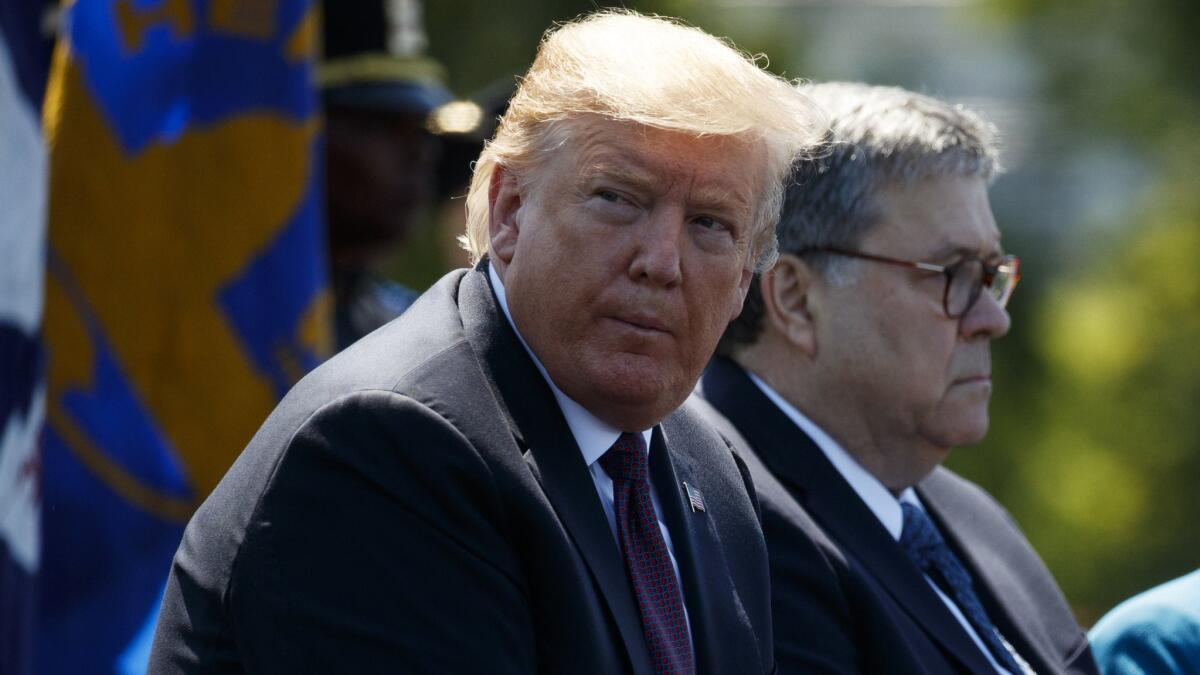Congress has the subpoena power to stand up to a bully president. Enforcing it is trickier

- Share via
The Trump administration has been flouting Congress’ oversight power with abandon, withholding documents, proclaiming that this or that aide or Cabinet member simply will not testify, deciding by fiat that the whole shebang is unconstitutional. The House’s slow-mo response — belated contempt votes and lawsuits — is fueling a Beltway refrain: Congress’ subpoena power is “weak.”
In fact, the House of Representatives has all the legal authority it needs to conduct executive branch oversight, including an impeachment inquiry targeting the president. What is weak — because it is untried — is its enforcement power.
In a well-functioning democracy, the chief law enforcement officer in the government is supposed to work for the people. In our democracy, that’s the federal attorney general. The FBI reports to him or her, as do federal prosecutors. The attorney general should be deploying men and women with handcuffs to enforce an order of contempt of Congress — which is a misdemeanor punishable by a $1,000 fine and up to a year in jail. Unfortunately, the Trump administration’s attorney general, William Barr, is refusing to faithfully uphold the laws of the country. He’s among those being held in contempt, and he thinks it’s a big joke.
Because Barr has no intention of enforcing congressional action, Corey Lewandowski, former Trump campaign manager, felt empowered to show up in a House hearing room and treat the representatives with sniveling disrespect. The Trump-appointed acting director of national intelligence, Joseph Maguire, sought Barr’s counsel on whether to do something as basic as comply with the whistleblower law, and decided to ignore it because Barr suggested he could get away with it. Former White House counsel Don McGahn doesn’t even work for the Trump administration anymore, but Congress has had to subpoena him and then sue him to try to compel his testimony. All of this is because Congress outsources enforcement to the Department of Justice, and that department is broken.
Not that Congress doesn’t share some of the blame. It has been far too slow — asking for cooperation from potential witnesses instead of issuing subpoenas from the get-go — to press its power. Helped along by some norm- and law-abiding witnesses, the House Judiciary Committee’s hearings haven’t been completely stonewalled. The next test will come when Trump, or his allies, decides to ignore the courts.
Unless precedent is ignored, McGahn will likely lose his blanket assertion of executive privilege. What if he still refuses to testify? Trump’s accounting firm has twice been told by the courts to turn over the president’s subpoenaed documents, but what if it doesn’t? (We’ve already seen one such scenario, Deutsche Bank, also subpoenaed by Congress for Trump’s financial documents, incredibly, claims to have discarded them.) What happens when, despite enforceable court orders, Trump et al. refuse to comply and the attorney general refuses to compel?
Congress has two options. First, there’s the guy who screams, “Mister/madame speaker, the president of the United States,” at the start of the annual State of the Union address. He’s the House sergeant at arms, the chief law enforcement officer of the lower chamber. Technically, and perhaps only technically, the sergeant at arms could arrest or apprehend McGahn should he continue to resist after the courts upheld a congressional subpoena.
Paul Irving, the current sergeant at arms, is a former Secret Service agent. No doubt he could physically collar McGahn should House Speaker Nancy Pelosi dispatch him to McGahn’s residence to compel him to appear. But if Pelosi were to replace Irving with the Rock, you’d know she’s serious for sure about holding the Trump administration accountable.
The U.S. Capitol Police force is another option. Charged with protecting Congress, these federal law officers uniquely report only to the legislative, not the executive, branch (the sergeant at arms is one of them). If the president’s accountants refuse to hand over documents despite a court order to do so, Pelosi could presumably order a phalanx of the Capitol police to seize those documents.
You see how quickly the breakdown between the branches of government gets dangerous. If Trump continues to act like a king, Pelosi has some authority to start acting like an Oliver Cromwell. But history tells us that such situations don’t work out well for kings or Cromwells. You could argue that the entire American system of government was designed to prevent such a conflict.
And yet the founders may not have contemplated an executive and his allies — the Republican Party — completely unwilling to act in the best interests of the nation and the rule of law. The GOP majority in the Senate should call a halt to what is an escalating constitutional crisis. They see the president abusing his powers in phone calls and on the White House lawn; they watch Barr using his office to aid and abet Trump and not the rule of law. They know Pelosi and House Democrats are not nearly as weak as the media portrays them.
Congress has thus far not used all of its power. Think of it like gravity. On any given day, it seems easy to overcome the force that holds us to the Earth just by standing up or dunking or putting fuel in a rocket ship. But try jumping out a high window. For a while, you’ll feel like you’re flying. Until suddenly you don’t.
The administration’s defiance can’t go on forever. Congress, the courts and the American people all have the authority to put it to a stop.
Elie Mystal, a former litigator, is the executive editor of the Above the Law website published by Breaking Media.
More to Read
A cure for the common opinion
Get thought-provoking perspectives with our weekly newsletter.
You may occasionally receive promotional content from the Los Angeles Times.









